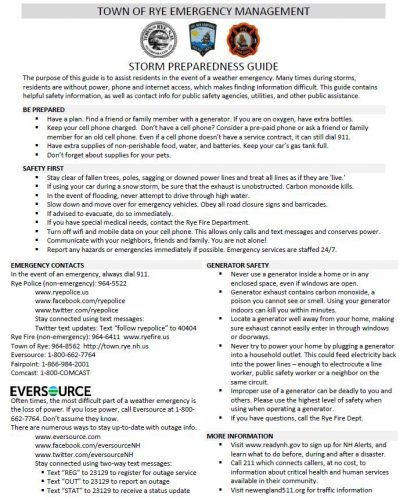Storm/Cold Weather Warning
RYE EMERGENCY MANAGEMENT
PRESS RELEASE
With heavy snow forecast for Thursday with possible coastal flooding, and record cold for Friday and Saturday with lows around -9 (wind chills down to -30), we want to make sure residents are prepared.
Check your home heating fuel tank level now. Due to the extreme cold, heating fuel companies are extremely busy. If you run out, you may not be able to get a delivery for days or weeks. Not only is the loss of heat dangerous for your family, it sets up the possibility of frozen pipes. Frozen pipes are a serious concern, as a burst water pipe can cause significant damage to your home. Keep in contact with family, friends and neighbors, especially the elderly. Here are some tips regarding frozen pipes:
How to Prevent Frozen Pipes
- Open kitchen and bathroom cabinet doors to allow warmer air to circulate around the plumbing. Be sure to move any harmful cleaners and household chemicals up out of the reach of children.
- When the weather is very cold outside, let the cold water drip from the faucet served by exposed pipes. Running water through the pipe - even at a trickle - helps prevent pipes from freezing.
- Keep the thermostat set to the same temperature both during the day and at night. By temporarily suspending the use of lower nighttime temperatures, you may incur a higher heating bill, but you can prevent a much more costly repair job if pipes freeze and burst.
- Learn how to shut off water valves in case a pipe bursts.
How to Thaw Frozen Pipes
- If you turn on a faucet and only a trickle comes out, suspect a frozen pipe. Likely places for frozen pipes include against exterior walls or where your water service enters your home through the foundation.
- Keep the faucet open. As you treat the frozen pipe and the frozen area begins to melt, water will begin to flow through the frozen area. Running water through the pipe will help melt ice in the pipe.
- Apply heat to the section of pipe using an electric heating pad wrapped around the pipe, an electric hair dryer, a portable space heater (kept away from flammable materials), or by wrapping pipes with towels soaked in hot water. Do not use a blowtorch, kerosene or propane heater, charcoal stove, or other open flame device.
- Apply heat until full water pressure is restored. If you are unable to locate the frozen area, if the frozen area is not accessible, or if you cannot thaw the pipe, call a licensed plumber.
- Use caution if using a generator. Never run indoors or near doors/windows. Hundreds of people die each year from CO poisoning due to improper use of a portable generator.
More information:
https://www.readynh.gov/disasters/winter-storms.htm
http://www.ryepolice.us/storm-preparedness

